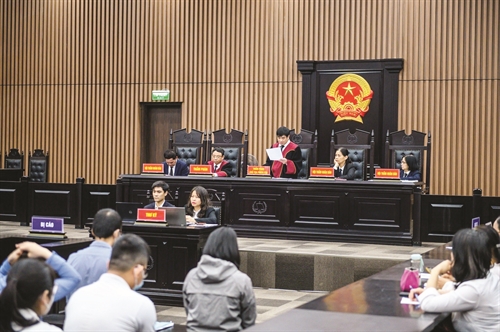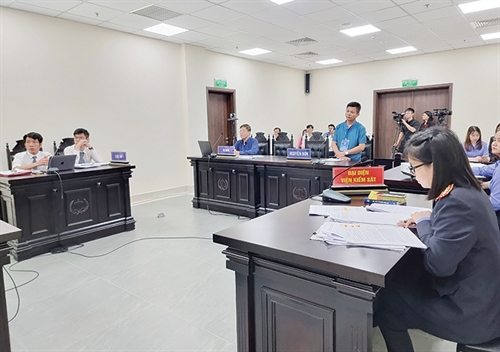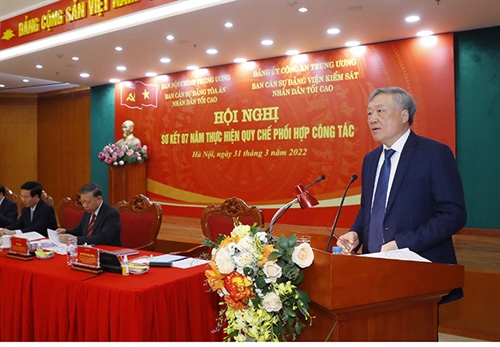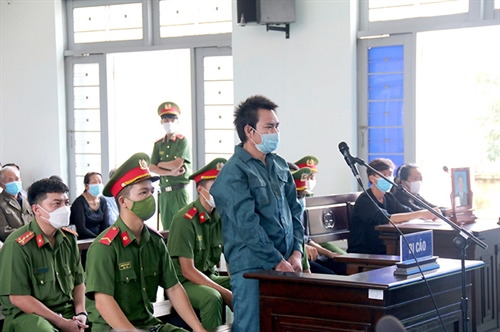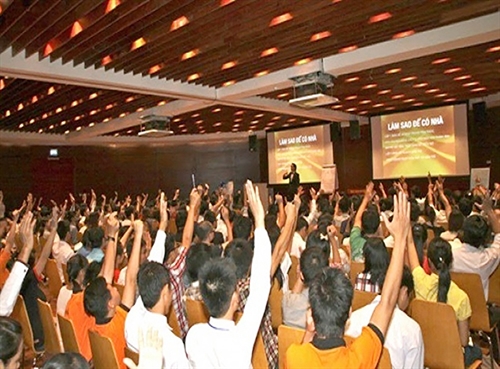Nguyen Thi Ny
Military Procuracy of Area 33 under the Military Procuracy of Military Zone 3
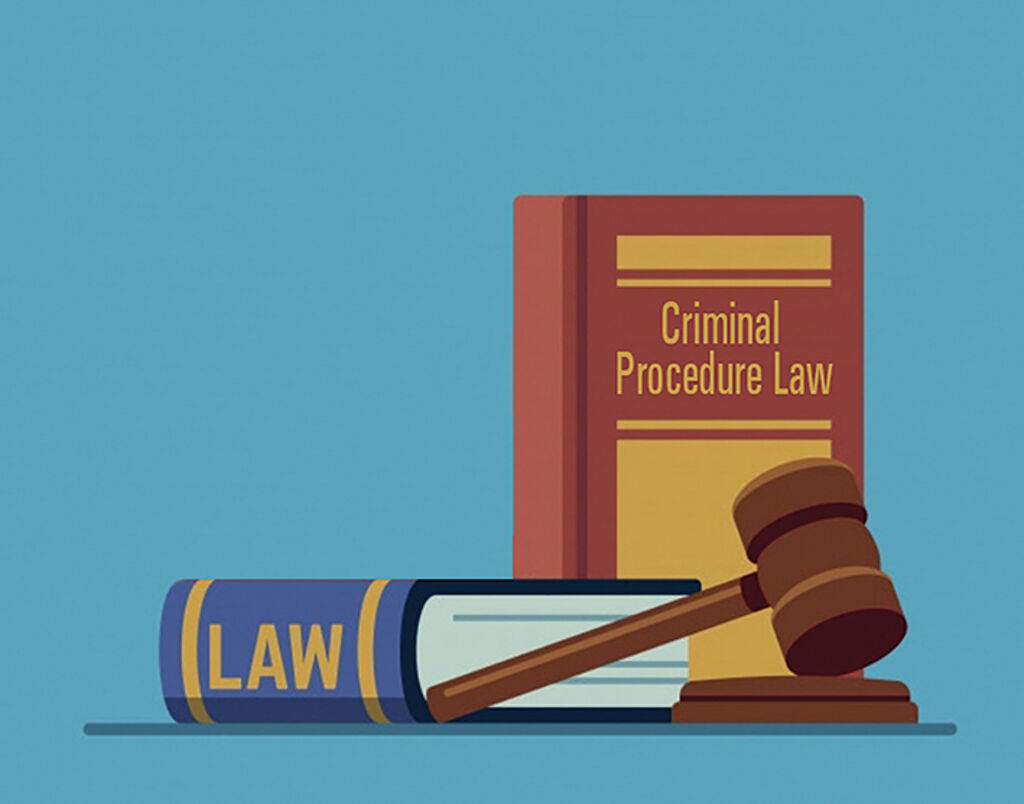 |
| Illustrative Photo__VLLF |
To protect witnesses in criminal proceedings, Vietnam’s law provides the protection of witnesses and exclusion from penal liability for persons who have personal relations with offenders, and specifies persons who may not act as witnesses. However, witness immunity should be officially institutionalized, especially in the criminal procedure law.
Witness immunity under Vietnam’s criminal procedure law
Witnessing means a witness providing information about circumstances related to a criminal case or matter to a proceeding-conducting body in order to identify the factual truth of such matter or case. Substantially, witnessing is to perform the obligation to make statements which constitute a source of evidence. Accordingly, witness immunity means the immunity of witnesses from the obligation to make statements. This is similar to the right to remain silent of criminally charged persons as enshrined in constitutions and legal systems of many countries worldwide. The fact that witnesses’ entitlement to immunity from the statement-making obligation is the outcome of development of the awareness about immunity from the statement-making obligation, meeting requirements of the protection of human rights and equality of rights and obligations among criminal proceeding participants.
In a narrow sense, witness immunity means the immunity of witnesses from obligatory making of statements against themselves or their family members (since such statements may be used to prosecute them or their family members). In a broader sense, witness immunity means the right of individuals to refuse to make statements against themselves or their family members and concurrently the right of persons who are banned by law from having their statements taken as witnesses’. Accordingly, persons entitled to witness immunity may refuse to participate in criminal proceedings while being supposed to do so. Thus, witness immunity can be construed as follows:
(i) Only persons who participate in criminal proceedings in the capacity as witnesses are entitled to witness immunity.
These persons must know circumstances related to criminal information or criminal cases and are summoned by bodies competent to conduct criminal proceedings to make statements. However, it is necessary to distinguish witnesses entitled to witness immunity from persons who are not qualified to act as witnesses, i.e., those who have mental or physical defects which render them incapable of perceiving circumstances relating to criminal information or criminal cases or incapable of making truthful statements[2].
(ii) Witness immunity aims to protect the rights of witnesses and needs to be observed by proceeding-conducting bodies.
Witness immunity is a tool to protect the rights of witnesses. In order to clarify the factual truth of criminal cases or matters, proceeding-conducting bodies may take statements of witnesses and request the latter to participate in certain procedural activities. However, in the course of conducting criminal proceedings, these bodies have to strictly adhere to the principles of respecting and protecting human rights and lawful rights and interests of individuals. In some criminal cases, witness immunity may help prevent infringements upon the lawful rights and interests of witnesses, particularly those who are not always able to make truthful statements because the criminal cases in which they act as witnesses involve their family members and their statements might affect their rights and interests, or they refuse to make statements in order to hide other violations (of regulations on ethics, religions, customs and practices), or they are minors and their psychology and normal mental development might be heavily affected by their witnessing.
(iii) Witness immunity is a privilege granted only to certain witnesses.
The general principle is that witnesses are obliged to state all circumstances they know in order to facilitate the quick, objective and accurate settlement of criminal cases. This statement-making obligation and immunity therefrom are both provided by law which exempts certain subjects in certain cases from performing the statement-making obligation or part thereof for plausible reasons or which states that proceeding-conducting bodies request no witness statements.
As per Vietnam’s current regulations, several categories of witnesses, who have family or occupational relations with criminally charged persons in criminal cases, will not be examined for penal liability for failing to perform the statement-making obligation even though they know or are supposed to know circumstances related to such criminal cases.
(iv) Persons entitled to witness immunity may choose to enjoy or not to enjoy this immunity while participating in criminal proceedings.
The rights and obligations of persons who are identified by proceeding-conducting bodies as witnesses are provided in Article 66 of the 2015 Criminal Procedure Code (the Code). However, witnesses entitled to witness immunity may opt to enjoy or not to enjoy this immunity while participating in criminal proceedings. In order to make witnesses fully aware of their immunity and decide whether to enjoy their immunity or not, proceeding-conducting bodies or persons have to clearly explain such immunity to witnesses and effects of their statements on the settlement of criminal cases.
Persons entitled to witness immunity under Vietnam’s law
As per the 2015 Penal Code (as revised in 2017) (the Penal Code) and the Code, the following persons are entitled to witness immunity:
(i) Persons who are not required to make statements in the capacity as witnesses, including:
· Persons competent to conduct the proceedings: Such a person has to refuse to conduct criminal proceedings or be replaced if he has participated in the proceedings as a witness in the same case[3]. In other words, a person competent to conduct the proceedings may not participate in the proceedings as a witness in the same case. The provision on witness immunity for persons competent to conduct the proceedings adheres to the principle of guaranteeing the impartiality of such persons and proceeding participants specified in Article 21 of the Penal Code. In criminal proceedings, investigators and procurators represent the accusing party in the name of the State and therefore cannot participate in criminal proceedings in the capacity as other proceeding participants. Moreover, the psychological belief of persons competent to conduct the proceedings is wholly based on collected evidences. These persons, though knowing circumstances of the case, are responsible for finding the factual truth of the case, so they cannot act as witnesses.
· Defense counsels of the accused and defendants: Under the Code, defense counsels will not be summoned to make statements in the capacity as witnesses[4] even though they might know circumstances of criminal cases through their defending activities. Defense counsels are those who are asked by criminally charged persons or appointed by proceeding-conducting bodies and allowed to to act as defense counsels. These include lawyers, representatives of criminally charged persons, people’s advocates and legal aid providers. That defense counsels refrain from acting as witnesses stems from the fact that defense counsels participate in criminal proceedings to defend criminally charged persons and therefore their impartiality in making statements is probably affected. Since defense counsels have legal knowledge and may know significant circumstances of criminal cases through the collection of evidences, it is possible that they make statements about facts of such cases in the direction of alleviating the severity and consequences of crimes for the sake of their clients. So, if they act as witnesses, such might affect lawful rights and interests of victims and other proceeding participants and make it harder for proceeding-conducting bodies to clarify the factual truth of such cases. The obligation of defense counsels, which is to seek every lawful measure to confirm circumstances that support the conclusion that criminally charge persons being their clients are innocent without disclosing information about criminal cases and their clients, conflicts with the obligation of witnesses to truthfully state circumstances they know.
(ii) Persons who have the obligation to make statements but are allowed by law to refuse to perform such obligation
Witnesses’ refusal to make statements in the course of participating in criminal proceedings is a socially dangerous act that affects activities of proceeding-conducting bodies and obstructs the investigation and identification of offenders as well as prevention of damage and proving of crimes. However, under Articles 18.2 and 19.2 of the Penal Code, witnesses are given the right to refuse to make statements about crimes, saying that offenders’ grandparents, parents, children, grandchildren, siblings and spouses who, though clearly knowing circumstances of such crimes, do not make statements (concealing crimes or failing to denounce crimes) will be exempt from penal liability, except crimes infringing upon national security and other particularly serious crimes. In other words, witnesses who are family members of offenders as mentioned above are, in particular cases, entitled to witness immunity, i.e., they may refuse to make statements about information related to crimes and offenders they know. This shows the humanity of Vietnam’s criminal procedure law and the Vietnamese State’s attention to ethical aspects of the State-citizen relation.
Recommendations
The right to witness immunity does not breach the witnessing obligation of citizens and should not be confused with cases of refusal to act as a witness without plausible reasons. In order to best protect the rights and interests of witnesses, witness immunity in certain cases in criminal proceedings should be treated as a fundamental right of citizens in the criminal procedure law and even in the Constitution. Specifically, witness immunity should be granted to:
(i) Persons whose statements can be used for examination of their penal liability
When participating in criminal proceedings as a witness, a person may become a criminally charged person in case his statements are used as evidences to incriminate him. Having the obligation to make truthful statements about circumstances of a crime or criminal case, he may face accusations stemming from his statements in such case. In case a witness is compelled to make statements that may be used against himself, he might face the risk of being prosecuted. In this case, it is suggested to take into consideration the following issues:
Firstly, the witness is involved in the crime and the performance of his witnessing obligation might put himself in a totally unfavorable situation in which he might become a person facing accusations stemming from his own statements. Is this against the Constitution’s spirit of protection of human rights and citizen rights and the Code’s principle of guaranteeing citizens’ equality before law?
Secondly, when the witness becomes a criminally charged person, how will his previous statements made in the capacity as the witness be evaluated and used in proving the crime?
Thirdly, Vietnam’s criminal procedure law provides that a witness may refuse to make statements in case he is a family member of the offender and deems that his statements may cause legal consequences unfavorable to the latter. Is it reasonable when the law is silent about this refusal right in case the witness finds himself falling in the danger of being examined for penal liability on the basis of his own statements?
From the above analyses, it can be seen that the criminal procedure law should give witness immunity to witnesses so that they can refuse to make statements about any circumstances or events of criminal cases or matters as far as they find that their statements are likely to be used against themselves. This immunity should be recognized not only in favor of witnesses but also as a tool to guarantee the exercise of human rights in criminal proceedings.
(ii) Persons aged under 18 years
While participating in criminal proceedings, under-18 witnesses (minors) are eligible for special procedures specified in Chapter XXVIII of the Code in order to have their interests best guaranteed.
Unlike adults, minors, due to their incomplete physical and mental development, normally remain unable to fully participate in social activities and be involved in diverse and complex relations and therefore should be entitled to witness immunity, depending on their age and their relationships with offenders and victims, even though this immunity is not given to witnesses in general[5].
(iii) Other persons
Considering the law-specified cases in which witnesses are obliged to make statements but allowed by law to refuse to perform such obligation and the Code’s provisions on cases of refusal to disclose documents of proceeding participants[6], the author recommends extending witness immunity to persons who have special social positions, occupations or personal status[7] in order to guarantee the inviolable right to personal privacy and secrets and family secrets. These persons may refuse to make statements and provide evidences related to their professional secrets for the reason that the disclosure of such secrets is likely to cause harms to themselves, their employers and the society. They should be notified of their immunity from the obligation to make statements and may then decide to waive such immunity. Statements of witnesses who are not notified of this immunity will not be recognized as evidences, unless they have already known this immunity but still decided to make statements.
Based on circumstances of specific criminal cases and personal identification characteristics of witnesses, proceeding-conducting bodies will decide whether or not to apply this immunity to such witnesses. The exercise of witness immunity in these cases should be prudently considered and examined in order to prevent witnesses from abusing it to refuse to make statements, thus affecting the settlement of criminal cases.
As per Article 29 of the 1993 Ordinance on Privileges and Immunities for Vietnam-Based Diplomatic Missions, Consulates and Representative Offices of International Organizations, staff members of consulates may choose to act as witnesses in proceedings but they are not compelled to provide evidences they know while performing their functions and tasks. They will not be subject to any coercive measures or penalties for their refusal to provide evidences. This provision implies that consuls and staff of consular offices are entitled to witness immunity due to the special characteristics of their diplomatic work. This content should also be included in the Code.-
[1] The Vietnamese version of this article is published on kiemsat.vn.
[2] Article 66.2.b of the 2015 Criminal Procedure Code.
[3] Article 49 of the Code.
[4] Article 66.2.a of the Code.
[5] This recommendation aims to protect the normal physical and mental development of minors and protect and nurture the family sentiment as well as their family-based living environment. In reality, not a few minors suffer psychological trauma after witnessing violent acts and become excited when being required by proceeding-conducting bodies to make statements that recall the violence acts. Therefore, proceeding-conducting bodies should consider the necessity and importance of the taking of statements of minors in order to decide to give witness immunity to them.
[6] Article 308.3 of the Code.
[7] These persons may include religious dignitaries and persons with high reputation in ethnic minority communities who hold secrets of their religious or ethnic communities and are bound to the duty not to disclose such secrets in any cases, even in making statements about circumstances of criminal cases; and persons working as medical doctors, pharmacists, information technology experts, civil servants, public employees, journalists, etc., and engaged in special tasks involving state secrets.




